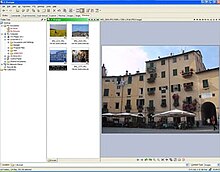Directory Opus: Difference between revisions
New Version 12.9 |
|||
| Line 26: | Line 26: | ||
==Features== |
==Features== |
||
Directory Opus has evolved since its first release in 1990 as a basic two-panel file manager. The interface has evolved significantly due |
Directory Opus has evolved since its first release in 1990 as a basic two-panel file manager. The interface has evolved significantly due feedback given by its users. Some of the features include: |
||
*Single- or dual-panel exploring.<ref>{{cite magazine |last=Mendelson|first=Edward|date=2004-06-08|title=File Managers|magazine=PC Magazine|publisher= Ziff Davis|issn=0888-8507|volume=23|number=10|pages=132}}</ref> |
*Single- or dual-panel exploring.<ref>{{cite magazine |last=Mendelson|first=Edward|date=2004-06-08|title=File Managers|magazine=PC Magazine|publisher= Ziff Davis|issn=0888-8507|volume=23|number=10|pages=132}}</ref> |
||
*Folder tree (either shared or two separate for dual-display). |
*Folder tree (either shared or two separate for dual-display). |
||
Revision as of 12:15, 9 June 2018
 | |
| Original author(s) | Jonathan Potter |
|---|---|
| Developer(s) | GPSoftware |
| Initial release | January 1990 |
| Stable release | 12.9
/ June 7, 2018[1] |
| Operating system | Microsoft Windows, AmigaOS |
| Type | File manager |
| License | Proprietary |
| Website | www |
Directory Opus (or "DOpus" as its users tend to call it) is a popular file manager program, originally written for the Amiga computer system in the early to mid-1990s. Development on the Amiga version ceased in 1997, but an entirely re-written version of Directory Opus is still being actively developed and sold for the Microsoft Windows operating system by GPSoftware.
Directory Opus was originally developed by, and is still written by, Australian Jonathan Potter. Until 1994, it was published by well-known Amiga software company Inovatronics, when the author joined with Greg Perry and the Australian-based GPSoftware to continue the development of the product, and it has been published by GPSoftware ever since.
Features
Directory Opus has evolved since its first release in 1990 as a basic two-panel file manager. The interface has evolved significantly due feedback given by its users. Some of the features include:
- Single- or dual-panel exploring.[2]
- Folder tree (either shared or two separate for dual-display).
- Tabbed explorer panels.
- Ability to maintain date created/modified timestamps for both files and folders.[3]
- Internal handling of ZIP, RAR, 7Zip and many other archive formats (browse them like folders).
- Internal FTP handling,[4] including (for a small extra fee) advanced FTP and SSH (browse these like folders also).
- Internal MTP handling for portable devices like phones and cameras.
- Flat-file display, where you can flatten a folder tree,[5] and even hide the folders themselves.
- Powerful file selection and renaming tools, with advanced regex if needed.
- User-definable toolbars, menus, filetypes and filetype groups.[6]
- Preview panel, and preview of thumbnails (including animated avi thumbnails).
- File collections. These are like virtual folders that contain links to the original files (unlike shortcuts, these actually deal with the files directly).
History
Release history


Amiga release history
- Opus 1: January 1990
- Opus 2: February 1991
- Opus 3: 1991-12-01
- Opus 4: 1992-12-04
- Opus 5: 1995-04-12
- Opus 5.5: 1996-08-01
- Opus Magellan (5.6): 1997-05-17
- Opus Magellan II (5.8): 1998-11-01
- Opus Magellan II GPL (5.90): 2014-05-11
Versions 1 and 2 were only available direct from the author. Versions 3 and 4[7] were published by Inovatronics. Versions since 5 have been published by GPSoftware (German versions were published by Stefan Ossowskis Schatztruhe). The full version of Magellan II is included for free with AmiKit package.
Windows major release history
- Opus 6: 2001-06-18
- Opus 8: 2004-10-04
- Opus 9: 2007-04-27[8]
- Opus 10: 2011-04-30[9]
- Opus 11: 2014-03-03[10]
- Opus 12: 2016-09-05[11]
All Windows versions published by GPSoftware. (German versions published by Haage & Partner Computer GmbH.)
Open source release history
- GPSoftware released the older Amiga Directory Opus 4 source code in 2000 as open source under the GNU General Public License.[12] AmigaOS4, AROS and MorphOS ports of this version were made available. Magellan II was released as open source under the AROS Public License in December 2012.[13]
The open source 'Worker' filemanager is heavily inspired by the Directory Opus 4 series [14]
See also
References
- ^ "Directory Opus stable release announcements".
- ^ Mendelson, Edward (2004-06-08). "File Managers". PC Magazine. Vol. 23, no. 10. Ziff Davis. p. 132. ISSN 0888-8507.
- ^ Rubenking, Neil J. (2006-04-11). "Incredibly useful utilities, Directory Opus 8". PC Magazine. Vol. 25, no. 6. Ziff Davis. pp. 98–99. ISSN 0888-8507.
- ^ Mendelson, Edward (2005-02-08). "Replace Windows Explorer". PC Magazine. Vol. 24, no. 2. Ziff Davis. p. 46. ISSN 0888-8507.
- ^ Harac, Ian (2014-03-31). "Directory Opus 11 review: The premier file manager for power users". PCWorld. Retrieved 2017-05-16.
- ^ Mendelson, Edward (2005-05-24). "File Managers". PC Magazine. Vol. 24, no. 9. Ziff Davis. pp. 92–93. ISSN 0888-8507.
- ^ Holborn, Jason (April 1993). "Directory Opus 4". Amiga Format. No. 45. Future Publishing. p. 135. ISSN 0957-4867.
- ^ "Directory Opus 9 release announcement".
- ^ "Directory Opus 10 release announcement".
- ^ "Directory Opus 11 release announcement".
- ^ "Directory Opus 12 release announcement".
- ^ "Amiga DirectoryOpus 4 Released Under GPL".
- ^ "Dopus5 – Directory Opus 5 (OpenSource)".
- ^ http://www.boomerangsworld.de/cms/worker/
